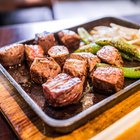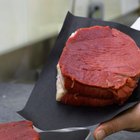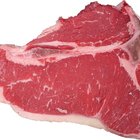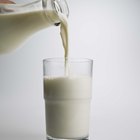Many ingredients are touted as meat tenderizers, such as vinegar, citrus juice, pineapple and kiwi. But milk is the only effective chemical tenderizer that does not pose a risk to the meat that is marinating in it. The keys to successfully tenderizing steak with milk is knowing which milk products are effective, which ingredients enhance or harm the meat and how to use the milk to achieve the most succulent steak possible.
Acids and Enzymes
There are two types of chemical tenderizers: acidic and enzymatic. Acidic tenderizers contain some form of acid, such as the lactic acid in milk or citric acid in lemons. Enzymatic tenderizers are fruits that contain a special enzyme that can denature proteins. Pineapple, kiwi, figs, papaya and raw ginger are all enzymatic tenderizers.
Why Other Chemical Tenderizers Fail
With the exception of milk-based products, chemical tenderizers are so strong they can harm meat if the flesh is exposed to the chemical too long. A steak that marinates in an acidic ingredient too long becomes tough and a steak that marinates in an enzymatic ingredient too long becomes mushy. The acids and enzymes work so fast they begin to damage the raw meat before they can penetrate the surface. The acid in milk, however, is so mild that you can soak meat in it long enough to tenderize it effectively without damaging the proteins on the surface.
Choosing a Milk Product
Milk is the ideal chemical tenderizer, because it is also rich in calcium, which reacts with enzymes in the meat to soften the proteins. Acids and enzymes do not react with protein enzymes. Several milk-based products are suitable for marinating steak. Whole milk is a fine choice, but buttermilk and yogurt have the optimal acidity for tenderizing, which is slightly higher than the acidity of milk. Buttermilk is a popular tenderizer in the American South, where cooks use it to soften meat before frying it. Yogurt is a staple in Indian cuisine -- cooks marinate, braise and stew meat in yogurt.
Prepare a Milk Marinade
Season the milk product to taste with herbs, spices and other nonacidic ingredients such as salt and garlic. Prepare enough marinade to submerge the whole steak. Place the steak and seasoned milk in a covered container or resealable plastic bag and marinate it for 4 to 12 hours. Refrigerate the steak while it soaks to prevent contamination. Rinse the meat in cool running water, pat it dry and discard the milk when it is finished marinating. Marinades only impart mild flavoring, so season the surface of the steak with herbs and spices if you want the flavors to be robust. Cover and rest the meat at room temperature for an hour before cooking. Steak sears better if the surface is at room temperature.
Related Articles

Can You Marinate Boneless Pork Sirloin ...

Does Soaking Elk Roast in Milk Do ...

Does a Dry Rub Meat Tenderizer Need to ...

Milk Protein for Skin Care

How to Soak Cube Steak in Milk
Can You Soak Pork Chops in Milk?

What Are the Ingredients in Proactiv?
How to Tenderize Steak Before Cooking ...

What Do You Put on a Steak Before ...
How Long Can You Marinate Meat Before ...

How to Know if Marinated Steak Is Bad

Does Olive Oil Tenderize Meat?
How to Marinate a Roast in Milk

How to Slice Round Steak for Jerky

What Juices Tenderize Steak?
Does Milk Help Tenderize Chicken?

How to Soak Deer Meat in Baking Soda

How to Make Breading Stick to Meat ...

Cooking With Buttermilk

Can You Marinate a Pork Shoulder ...
References
Writer Bio
Lamar Grey has been writing about cooking and food culture since 2010. He has ghostwritten eight cookbooks. Grey entered the culinary industry in 2003 as a prep cook in a full-service restaurant. He subsequently served as a baker and head cook on three award-winning kitchen staffs.